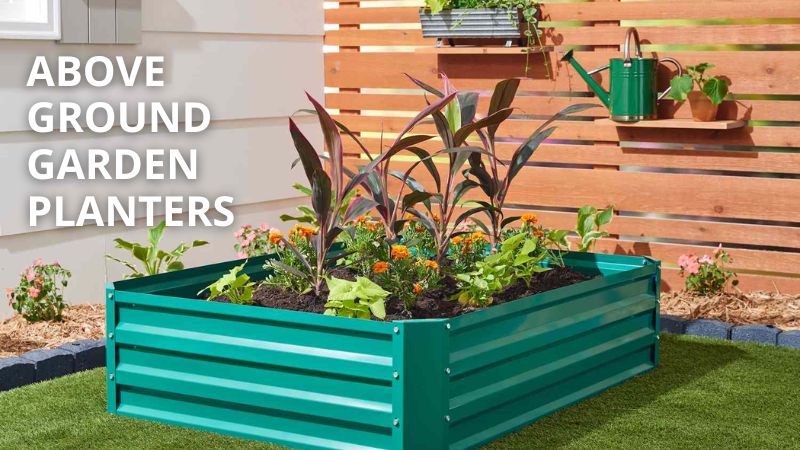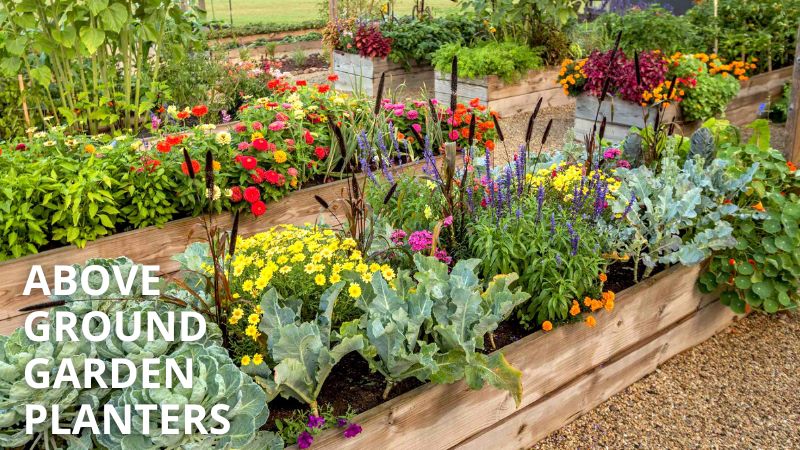GARDEN DECORATION
Top 10 Benefits of Using Above Ground Garden Planters
Gardening has long been a cherished activity, providing a source of food, beauty, and relaxation. As urban living spaces become smaller and environmental concerns rise, innovative gardening solutions are more important than ever. Above ground garden planters, also known as raised garden beds or elevated planters, have gained popularity among gardeners for their practicality and versatility. This article Floral Garden Ideas shares the benefits of using above ground planters and how they can enhance your gardening experience.
The Benefits of Using Above Ground Garden Planters
Improved Soil Quality
One of the most significant advantages of above ground planters is the ability to control the soil quality. Gardeners can fill their planters with a custom mix of soil, compost, and organic matter, creating an ideal growing environment for plants. This control allows for better drainage, aeration, and nutrient availability compared to traditional in-ground gardening. Additionally, above-ground planters reduce soil compaction, promoting healthier root growth.
Enhanced Accessibility
Above ground garden planters are especially beneficial for individuals with mobility issues, such as the elderly or those with physical disabilities. Elevated planters allow gardeners to tend to their plants without bending down, making it easier to sow seeds, weed, and harvest. This accessibility promotes a more enjoyable gardening experience and encourages participation from people of all ages and abilities.
Pest and Weed Control
Raised planters can help reduce pest problems and make it easier to manage weeds. The elevation of the planter can deter certain pests, such as slugs and snails, which prefer ground-level environments. Moreover, the defined space of above ground planters makes it simpler to control weeds. A layer of mulch can be added to suppress weed growth, reducing the time and effort spent on weeding.
Extended Growing Season
Above-ground planters often warm up faster in the spring compared to in-ground gardens, which can extend the growing season. The soil in raised beds tends to thaw earlier and retains heat longer in the fall, allowing gardeners to plant earlier and harvest later. This advantage is particularly beneficial in regions with short growing seasons, enabling gardeners to maximize their yield.
Better Drainage
Good drainage is essential for healthy plant growth, and above-ground planters excel in this regard. By elevating the planting area, excess water drains more effectively, preventing root rot and other moisture-related problems. Gardeners can also amend the soil mix to improve drainage further, making it easier to grow plants that require specific moisture levels.
Versatility and Space Optimization

Above-ground planters come in various shapes, sizes, and materials, allowing for endless design possibilities. They can be placed on patios, balconies, or in small yards, making them ideal for urban gardening. Vertical planters can also be used to maximize space, enabling gardeners to grow more in limited areas. Additionally, planters can be moved around, allowing for flexibility in garden design and exposure to sunlight.
Aesthetic Appeal
Above ground garden planters add visual interest and charm to outdoor spaces. Available in various designs, materials, and colors, they can complement any landscape or home decor. Whether you prefer rustic wooden planters, sleek metal designs, or vibrant ceramic pots, elevated planters can enhance the overall aesthetics of your garden or patio.
Reduced Soil Erosion and Compaction
In traditional in-ground gardens, soil erosion can occur due to rainfall and wind, leading to nutrient loss and degraded soil health. Above ground planters help combat this issue by keeping the soil contained and protected from the elements. Additionally, raised beds reduce soil compaction, which can occur from foot traffic in garden areas. This allows for healthier root development and improved water retention.
Sustainable Gardening Practices
Using above-ground planters can encourage sustainable gardening practices. By selecting organic soil amendments and practicing crop rotation within the planter, gardeners can promote biodiversity and enhance soil health. Furthermore, elevated planters are often designed to collect rainwater, providing a natural irrigation source that reduces water waste.
Educational Opportunities
Above-ground planters offer excellent opportunities for education and engagement, especially for families with children or schools looking to incorporate gardening into their curriculum. Kids can learn about plant biology, nutrition, and the importance of sustainable practices through hands-on experience. The elevated nature of the planters makes it easier for children to participate without the need for excessive bending or kneeling.
Conclusion
Above ground garden planters present numerous benefits that make gardening more accessible, efficient, and enjoyable. From improved soil quality and enhanced accessibility to better pest control and aesthetic appeal, these planters are a practical solution for gardeners of all experience levels. Whether you’re a seasoned gardener or a novice, incorporating above ground planters into your gardening routine can lead to a vibrant, productive garden that enhances your outdoor space. As we face the challenges of urban living and environmental sustainability, embracing innovative gardening methods like above ground planters is a step toward a greener, more sustainable future. Hopefully, the above sharing of Floral Garden Ideas has brought you useful knowledge.


